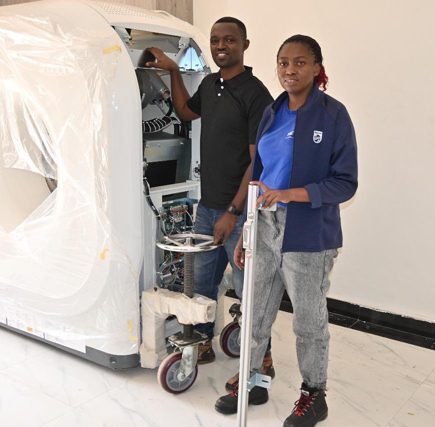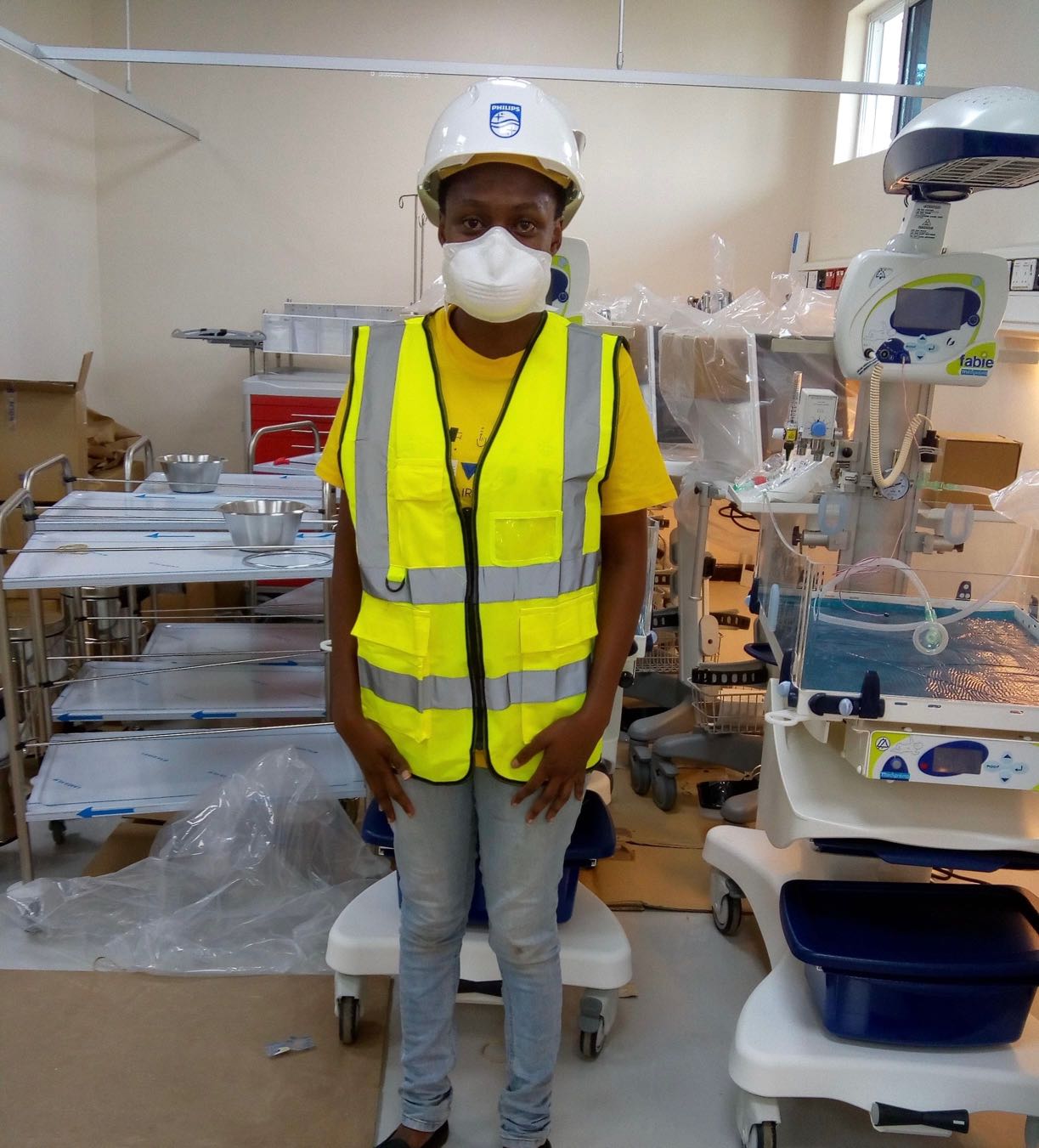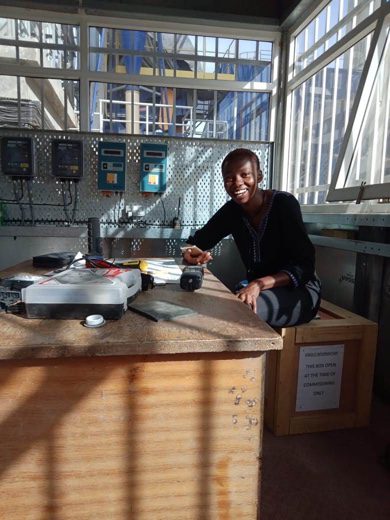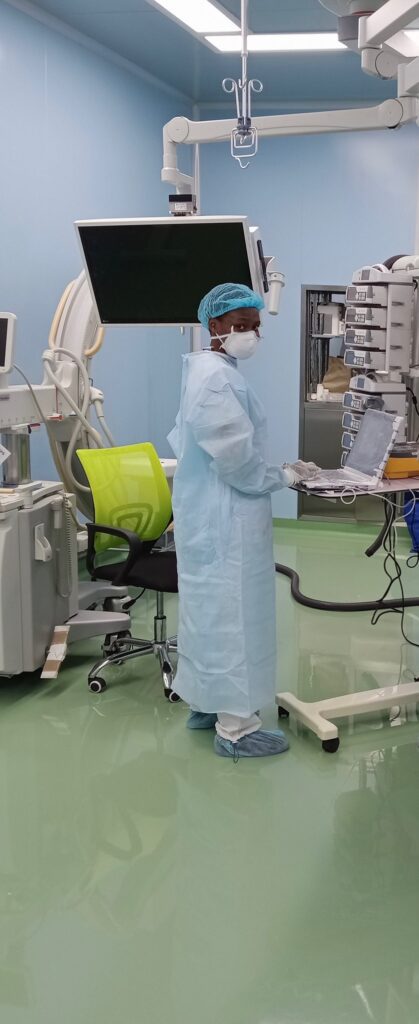Ruth Otieno – Philips Field Service Engineer in Kenya
Ruth Otieno works as a Field Service Engineer for Philips and is the Technical Operations lead for Philips Women Lead Network. Ruth graduated in BSc Electronics and Computer Engineering from Jomo Kenyatta University of Agriculture and Technology and is also currently pursuing her Master’s in Business Administration from SBS (Swiss Business School). Before she moved into healthcare, she worked in Food Manufacturing as an Installation and Operations Lead for a Milling Company in Nairobi.
Work and experience as a Philips Field Service Engineer


Typical day
How many different pieces of work do you cover over the course of a year?
According to last year’s stats, I worked on 804 instances. This could be with either repeat customers or new customers. The instances could also either be a preventive case (scheduled), incident (ad-hoc) or installation.
How much of your time is spent with equipment on site and how much with admin and other tasks?
80% of my time is spent on machines and 20% on admin and other tasks which could also include training.
Which other departments or people do you interact with?
In the hospital, mostly the biomedical department or the users and sometimes the students.
Being out in the field can be lonely. How do you stay in touch during the working day?
It doesn’t often seem lonely, especially if you make relationships with the customers.
The secret to not feeling lonely is engaging with the customer and building a relationship so a site visit can then feel like visiting an old friend.
When that is done, you do not notice time flying by when you are engaged in a task.
Equipment used while working as a Philips Field Service Engineer
Can you outline the equipment you work on now?
I work on three categories of equipment:
Patient monitoring and Therapeutic Care equipment which includes patient monitors, ventilators, ECG machines, Defibrillators among others.
Ultrasounds
CT scan equipment.
What’s the best piece of equipment you have ever worked on?
Ease of repair – Best in terms of ease of repair are the Philips patient monitors and ECG machines.
Good diagnostics tools – Best in terms of good diagnostics tools, is the Philips CT range of equipment.
Fun to work on – Best in terms of fun to work on would be the Philips Ultrasound range.


Mentors for your life as a Field Service Engineer at Philips and elsewhere
Who were your mentors and who encouraged you?
I got into engineering because I admired my father’s work.
My current mentor is Nancy Kasvosve, and there have been many other people who have helped and inspired my journey as I progressed in the role. For example, my manager Boniface Orang’i and LSP (Large Scale Projects) manager Stephen Vala who have been Field Service Engineers. This is because my dream is to also transition into business in a couple of years.
As well as these people, my colleagues, my mother, and many others have been mentors, mentees, and sources of encouragement. This is because I get inspiration very randomly and work to my own rhythm.
Safety and security for Field Service Engineers
What advice would you give to women field engineers in terms of safety/security/being out in the field?
My key piece of advice is that because the job always requires a lot of travelling, have a spare set of the safety gear and tools needed both at home and in your travelling vehicle. Then you will never be without what you need to keep you safe and to do the job.
Secondly, always pre plan a field visit. This gives you an idea of what you will need before going to the site and will save time that would otherwise be wasted when having to prepare out in the field.
Lastly maintain a very good relationship with the customers. I have always found that situations can be made manageable due to the trust and relationships I have made with customers.
Confidence
What are your tips for feeling confident and not out of place?
I am naturally introverted, but what I learnt that really helps and makes my work easier is to engage.
Engaging is not small talk. Engaging is genuinely participating in conversations even if it is just taking an active listening role.
I find that engaging opens up more genuine conversations and in turn creates genuine relationships or “workships”.
Being present through engagement makes you gain a lot of insight as to how to deal with the other party. This for me brings out confidence and has helped me blend in at work, in the field, in forums and at home.
Increasing numbers of women field engineers
The number of women in field engineering is increasing. How can this be helped?
Communities like The Field Engineer are one of the things that can be useful in connecting us, through sharing our experiences and creating networks. This goes a long way especially for finding information and mentorship.
In my case, I did not get mentorship before getting into the role so there are some things I learnt on the job and did so while working with my colleagues while finding my own rhythm.
When there is more information out there then the field can grow and innovations around it can also be made.
I think something that is very important to women in engineering in general and especially in field engineering is to have a workspace that values diversity, equity, and inclusion. This goes a long way to creating confident, innovative, and agile women in field engineering.
Something else which helps is to have some training in business or business studies. This makes meaningful discussions with customers easier, and then leads to a better understanding of the customer’s anatomy both technically and business-wise.


Making a winner based on your experience as a Philips Field Service Engineer
What makes the type of engineer who is tomorrow’s senior engineer or team leader?
An agile mindset. I know the technical side matters but in this age of information, having technical brilliance is just one side of the coin.
Having agility means you become a flexible thinker and quickly adapt to changing situations. Apart from the technicalities, it means you will:
understand the team more;
be able to think outside the box;
use your ability to adapt or train in places where you need to;
have empathy, insight, and understanding both for the team or the customer.
I also believe some management or business training is important. Learning engineering meant we learnt the technical side of the coin. Leadership, as much as I believe that for some people it comes naturally, it also needs business or management training to give a quality output.
Training
How important is ongoing training?
Training is very important if quality is to be upheld. We are in a world that is constantly and rapidly changing. For quality to be part of the conversation then training has to be in the same sentence. Training for the new concepts and even the old.
Augmented reality and remote support
With AR and remote support being used more and more, how can field engineers prepare themselves for how their jobs will change?
Field engineers can do this by training and being part of the change, and so adapting.
In my opinion technologies like AR/VR can make work really easy depending how you look at it.
Using AR/VR in customer support and diagnosis, may reduce field visits. However, it would require a collaborative team and incentives to the customer who would wish to be the first contact for diagnosis. I believe equipment service providers need to communicate well with the customers to allow for a seamless collaboration.
Using AR/VR in training and repair would reduce the number and bulk of manuals, training time, and reduce the steepness of the learning curve. I feel this would shorten field visit time and enable correct identification of parts: a big win for field engineers and a huge reduction in operational costs.
This is an article about AR in field service that I found interesting.
Augmented reality in field service


New field engineers
What advice would you give to someone who has just started their first job as a field engineer?
Firstly, do as much training as you can. If you can, buddy up with another colleague for a while if that is available. There are things and tips you can learn from them that can make work easier.
If you are not in a position to have a buddy. Before going on any field visit spend time pre planning and going over everything and the tools you may need. Always read the manual because it will also point out things you may need. Have the correct safety gear and some spares in your vehicle.
Remember that your life is important, so health and safety first.
Technical terms
What are your tips for explaining technical terms to non-technical people? Can you give an example?
I think this is where we need some training. When you understand that not everyone speaks the same language and has their own language, understanding begins. Each team will have a different language and different metrics that are important to them. For example:
details on why the machine went down
which parts have failed
how much the part costs
how long the machine will be down.
Each team will look at these things differently. The technical team might look at it from a learning point and the administration team from a loss of revenue point.


Further reading
Richard Baker, GenesisCare – leading a team of Radiotherapy Equipment Engineers
Biomed engineers share their experience and advice


Responses